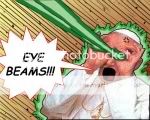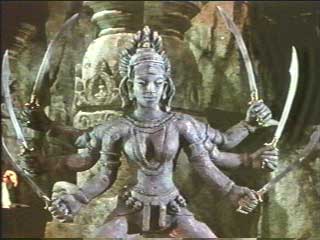There Goes My Hero...
Did Jesus Exist?
from The Associated Press
ROME — Lawyers for a small-town parish priest have been ordered to appear in court next week after the Roman Catholic cleric was accused of unlawfully asserting what many people take for granted: that Jesus Christ existed.
Lawyers for a small-town parish priest have been ordered to appear in court next week after the Roman Catholic cleric was accused of unlawfully asserting what many people take for granted: that Jesus Christ existed.
The Rev. Enrico Righi was named in a 2002 complaint filed by Luigi Cascioli after Righi wrote in a parish bulletin that Jesus did indeed exist, and that he was born of a couple named Mary and Joseph in Bethlehem and lived in Nazareth.
Cascioli, a lifelong atheist, claims that Righi violated two Italian laws by making the assertion: so-called "abuse of popular belief" in which someone fraudulently deceives people; and "impersonation" in which someone gains by attributing a false name to someone.
Cascioli says that for 2,000 years the Roman Catholic Church has been deceiving people by furthering the fable that Christ existed, and says the church has been gaining financially by impersonating as Christ someone by the name of John of Gamala, the son of Judas from Gamala.
He also asserts that the Gospels — the most frequently cited testimony of Jesus' existence — are inconsistent, full of errors, and biased, and that other written evidence from the time is scant and doesn't hold up to scholarly analysis.
Prosecutors, who in Italy are obliged to investigate such complaints, initially tried to have the case dismissed, saying no crime could be verified.
But Cascioli challenged them, and Judge Gaetano Mautone set a hearing for next Friday in Viterbo, north of Rome, to discuss preliminary motions in Cascioli's bid to have the court appoint technical experts to review the historical data and determine if Jesus really did exist.
Cascioli, 72, said in a recent interview that he decided to pursue the case against Righi, a priest in the village of Bagnoregio, near Viterbo, because the cleric had written in the parish bulletin that Jesus existed.
Asked why he went after Righi — a schoolmate when he and Cascioli were boys — and not any number of bishops, cardinals or even the pope who have asserted the very same thing, Cascioli said it didn't really matter whom he named in his complaint.
"When one demonstrates that Christ didn't exist, attacking a simple priest is the same thing as attacking a bishop or cardinal," Cascioli said.
Cascioli is quick to stress that he has no problem with Christians freely professing their faith. Rather, he says in his complaint, he wants to "denounce the abuse that the Catholic Church commits by availing itself of its prestige in order to inculcate — as if being real and historical — facts that are really just inventions."
Righi, who has been a priest for 50 years, declined to be interviewed on the advice of his lawyers before the pending court date. But he set out his rebuke of Cascioli in a recent issue of his parish bulletin "Risveglio," or "Awaken," and said by telephone that the article encapsulated his position.
Righi argues that the existence of Christ is "unmistakable" because of the substantial historical evidence — both pagan and religious — testifying that he indeed lived.
"Cascioli maintains that Christ never existed. If he doesn't see the sun at midday, he can't denounce me just because I do. He should denounce all believers!" Righi wrote.
He cited many known observers, including non-Christian ones, who have written about the existence of Jesus, including the Jewish historian Flavius Josephus, considered by scholars to be the most important non-Christian source on Christ's existence.
A passage of Josephus' Jewish Antiquities, completed in A.D. 93, cites the execution in A.D. 62 of "the brother of Jesus the so-called Christ, James by name."
Righi also cited Pliny the Younger, who in the early second century described a policy of executing Christians who refused to curse Christ, and Tacitus, another writer of the same time who wrote that Jesus was executed by the sentence of Pontius Pilate.
"You would have to give lie to each, one by one, to cancel the Christ man that they speak of," Righi wrote.
R. Scott Appleby, a professor of church history at the University of Notre Dame, concurs. There's "no real doubt" that Jesus existed, he said.
"But what Jesus of Nazareth did and what he means is a different question," Appleby said. "But on the question of the existence, there is more evidence of the existence of Jesus of Nazareth than there would be for many other historical people who actually existed. Not only did Jesus actually exist, but he actually had some kind of prominence to be mentioned in two or three chronicles."
Cascioli says he fully recognizes that his case has a slim chance of succeeding in overwhelmingly Catholic Italy, but not because his argument is lacking.
"We aren't optimistic — unless the Madonna makes a miracle, but I don't think that will happen," he joked.
Cascioli says he is merely going through the necessary legal steps in Italy so he can ultimately take the matter to the European Court of Human Rights, where he intends to pursue the case against the church for "religious racism."
"I was born against Christ and God," he said. "I'm doing it (the complaint) now because I should do it before I die."
from The Associated Press
ROME —
 Lawyers for a small-town parish priest have been ordered to appear in court next week after the Roman Catholic cleric was accused of unlawfully asserting what many people take for granted: that Jesus Christ existed.
Lawyers for a small-town parish priest have been ordered to appear in court next week after the Roman Catholic cleric was accused of unlawfully asserting what many people take for granted: that Jesus Christ existed.The Rev. Enrico Righi was named in a 2002 complaint filed by Luigi Cascioli after Righi wrote in a parish bulletin that Jesus did indeed exist, and that he was born of a couple named Mary and Joseph in Bethlehem and lived in Nazareth.
Cascioli, a lifelong atheist, claims that Righi violated two Italian laws by making the assertion: so-called "abuse of popular belief" in which someone fraudulently deceives people; and "impersonation" in which someone gains by attributing a false name to someone.
Cascioli says that for 2,000 years the Roman Catholic Church has been deceiving people by furthering the fable that Christ existed, and says the church has been gaining financially by impersonating as Christ someone by the name of John of Gamala, the son of Judas from Gamala.
He also asserts that the Gospels — the most frequently cited testimony of Jesus' existence — are inconsistent, full of errors, and biased, and that other written evidence from the time is scant and doesn't hold up to scholarly analysis.
Prosecutors, who in Italy are obliged to investigate such complaints, initially tried to have the case dismissed, saying no crime could be verified.
But Cascioli challenged them, and Judge Gaetano Mautone set a hearing for next Friday in Viterbo, north of Rome, to discuss preliminary motions in Cascioli's bid to have the court appoint technical experts to review the historical data and determine if Jesus really did exist.
Cascioli, 72, said in a recent interview that he decided to pursue the case against Righi, a priest in the village of Bagnoregio, near Viterbo, because the cleric had written in the parish bulletin that Jesus existed.
Asked why he went after Righi — a schoolmate when he and Cascioli were boys — and not any number of bishops, cardinals or even the pope who have asserted the very same thing, Cascioli said it didn't really matter whom he named in his complaint.
"When one demonstrates that Christ didn't exist, attacking a simple priest is the same thing as attacking a bishop or cardinal," Cascioli said.
Cascioli is quick to stress that he has no problem with Christians freely professing their faith. Rather, he says in his complaint, he wants to "denounce the abuse that the Catholic Church commits by availing itself of its prestige in order to inculcate — as if being real and historical — facts that are really just inventions."
Righi, who has been a priest for 50 years, declined to be interviewed on the advice of his lawyers before the pending court date. But he set out his rebuke of Cascioli in a recent issue of his parish bulletin "Risveglio," or "Awaken," and said by telephone that the article encapsulated his position.
Righi argues that the existence of Christ is "unmistakable" because of the substantial historical evidence — both pagan and religious — testifying that he indeed lived.
"Cascioli maintains that Christ never existed. If he doesn't see the sun at midday, he can't denounce me just because I do. He should denounce all believers!" Righi wrote.
He cited many known observers, including non-Christian ones, who have written about the existence of Jesus, including the Jewish historian Flavius Josephus, considered by scholars to be the most important non-Christian source on Christ's existence.
A passage of Josephus' Jewish Antiquities, completed in A.D. 93, cites the execution in A.D. 62 of "the brother of Jesus the so-called Christ, James by name."
Righi also cited Pliny the Younger, who in the early second century described a policy of executing Christians who refused to curse Christ, and Tacitus, another writer of the same time who wrote that Jesus was executed by the sentence of Pontius Pilate.
"You would have to give lie to each, one by one, to cancel the Christ man that they speak of," Righi wrote.
R. Scott Appleby, a professor of church history at the University of Notre Dame, concurs. There's "no real doubt" that Jesus existed, he said.
"But what Jesus of Nazareth did and what he means is a different question," Appleby said. "But on the question of the existence, there is more evidence of the existence of Jesus of Nazareth than there would be for many other historical people who actually existed. Not only did Jesus actually exist, but he actually had some kind of prominence to be mentioned in two or three chronicles."
Cascioli says he fully recognizes that his case has a slim chance of succeeding in overwhelmingly Catholic Italy, but not because his argument is lacking.
"We aren't optimistic — unless the Madonna makes a miracle, but I don't think that will happen," he joked.
Cascioli says he is merely going through the necessary legal steps in Italy so he can ultimately take the matter to the European Court of Human Rights, where he intends to pursue the case against the church for "religious racism."
"I was born against Christ and God," he said. "I'm doing it (the complaint) now because I should do it before I die."




























0 Comments:
Post a Comment
<< Home